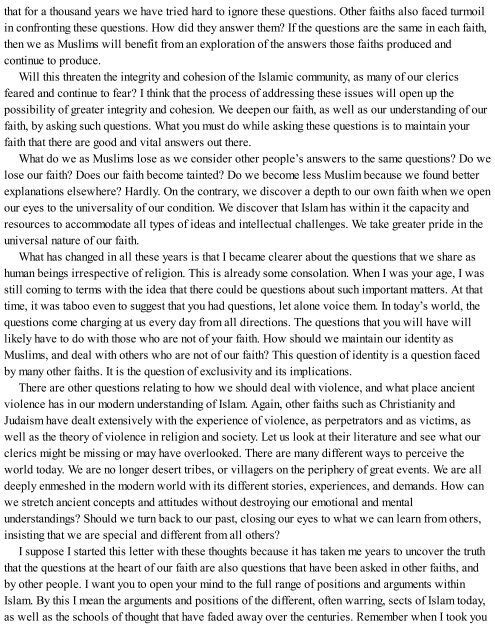1250119847
Create successful ePaper yourself
Turn your PDF publications into a flip-book with our unique Google optimized e-Paper software.
that for a thousand years we have tried hard to ignore these questions. Other faiths also faced turmoil<br />
in confronting these questions. How did they answer them? If the questions are the same in each faith,<br />
then we as Muslims will benefit from an exploration of the answers those faiths produced and<br />
continue to produce.<br />
Will this threaten the integrity and cohesion of the Islamic community, as many of our clerics<br />
feared and continue to fear? I think that the process of addressing these issues will open up the<br />
possibility of greater integrity and cohesion. We deepen our faith, as well as our understanding of our<br />
faith, by asking such questions. What you must do while asking these questions is to maintain your<br />
faith that there are good and vital answers out there.<br />
What do we as Muslims lose as we consider other people’s answers to the same questions? Do we<br />
lose our faith? Does our faith become tainted? Do we become less Muslim because we found better<br />
explanations elsewhere? Hardly. On the contrary, we discover a depth to our own faith when we open<br />
our eyes to the universality of our condition. We discover that Islam has within it the capacity and<br />
resources to accommodate all types of ideas and intellectual challenges. We take greater pride in the<br />
universal nature of our faith.<br />
What has changed in all these years is that I became clearer about the questions that we share as<br />
human beings irrespective of religion. This is already some consolation. When I was your age, I was<br />
still coming to terms with the idea that there could be questions about such important matters. At that<br />
time, it was taboo even to suggest that you had questions, let alone voice them. In today’s world, the<br />
questions come charging at us every day from all directions. The questions that you will have will<br />
likely have to do with those who are not of your faith. How should we maintain our identity as<br />
Muslims, and deal with others who are not of our faith? This question of identity is a question faced<br />
by many other faiths. It is the question of exclusivity and its implications.<br />
There are other questions relating to how we should deal with violence, and what place ancient<br />
violence has in our modern understanding of Islam. Again, other faiths such as Christianity and<br />
Judaism have dealt extensively with the experience of violence, as perpetrators and as victims, as<br />
well as the theory of violence in religion and society. Let us look at their literature and see what our<br />
clerics might be missing or may have overlooked. There are many different ways to perceive the<br />
world today. We are no longer desert tribes, or villagers on the periphery of great events. We are all<br />
deeply enmeshed in the modern world with its different stories, experiences, and demands. How can<br />
we stretch ancient concepts and attitudes without destroying our emotional and mental<br />
understandings? Should we turn back to our past, closing our eyes to what we can learn from others,<br />
insisting that we are special and different from all others?<br />
I suppose I started this letter with these thoughts because it has taken me years to uncover the truth<br />
that the questions at the heart of our faith are also questions that have been asked in other faiths, and<br />
by other people. I want you to open your mind to the full range of positions and arguments within<br />
Islam. By this I mean the arguments and positions of the different, often warring, sects of Islam today,<br />
as well as the schools of thought that have faded away over the centuries. Remember when I took you
















